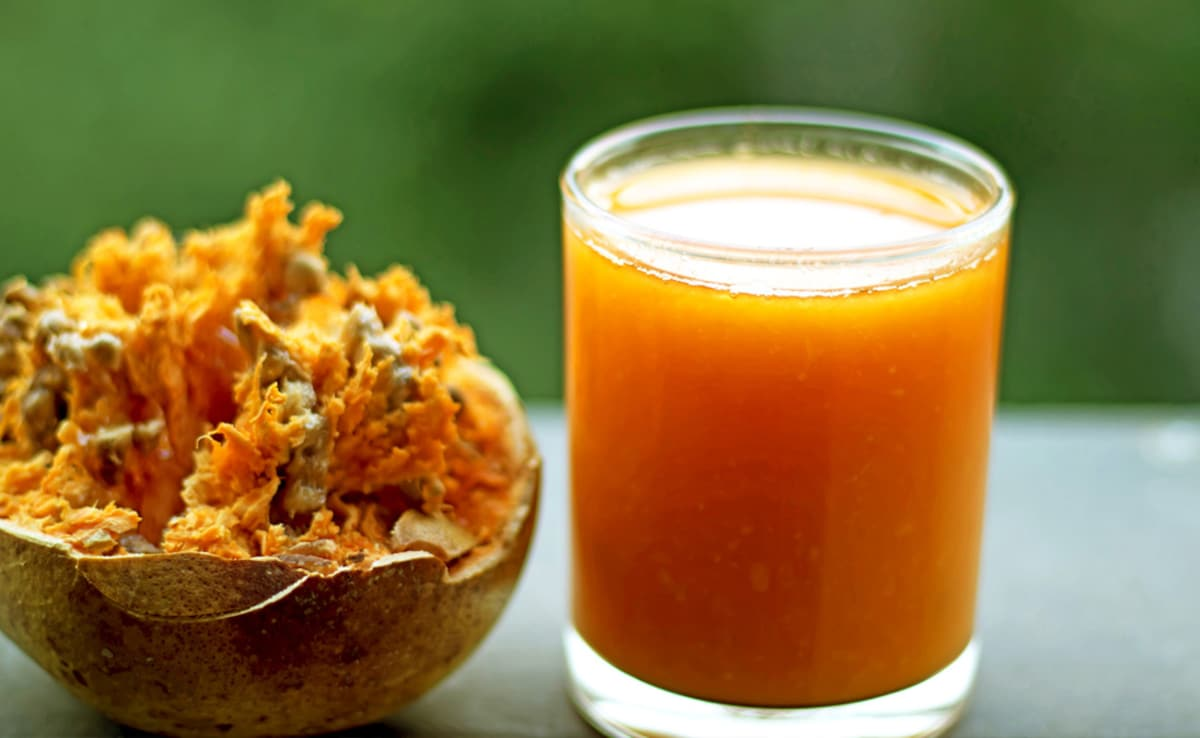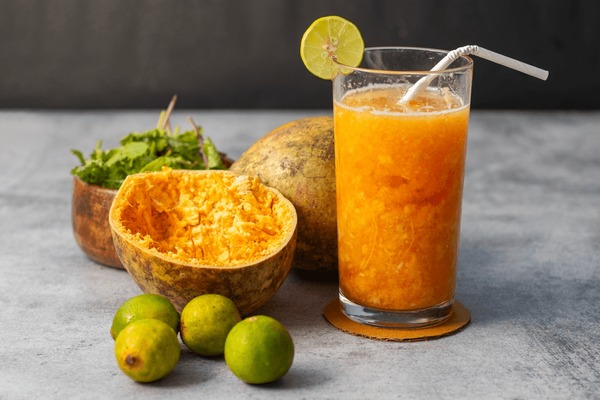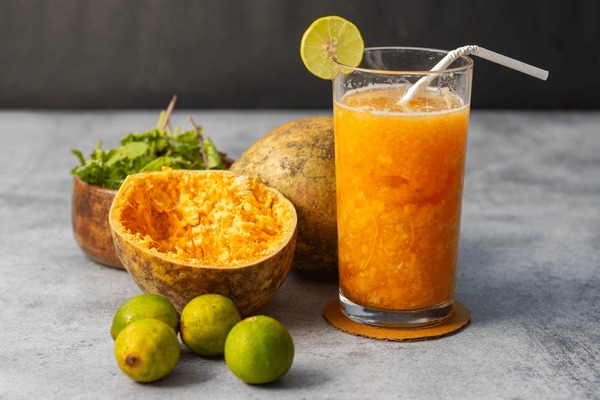

Bael juice
Bael juice is rich in fibre and antioxidants, which helps regulate
bowel movements. It is rich in laxative properties, which
prevent constipation. Bael juice is high in water content, which
helps replenish lost fluid from the body. It also maintains
electrolyte balance.
What is the Benefits of Bael Juice ?
Bael fruit, scientifically known as Aegle marmelos, is a tropical
fruit native to the Indian subcontinent and Southeast Asia. Also
referred to as the “wood apple,” it holds a revered status in
traditional medicine systems like Ayurveda for its numerous
health benefits. In this comprehensive guide, we’ll explore the
nutritional composition, health benefits, culinary uses, and
much more about this extraordinary fruit, focusing specifically
on the Benefits of Bael Juice.
Introduction to Bael Fruit
Bael fruit is a citrus fruit with a hard, woody shell and sweet,
aromatic pulp inside. It has a long history of cultural
significance, often associated with religious rituals and
traditional practices. The fruit is widely cultivated in India, Sri
Lanka, Thailand, and other tropical regions.
Nutritional Composition of Bael Fruit
Bael fruit, also known as Aegle marmelos, is a tropical fruit
native to India and Southeast Asia. It’s highly regarded for its
medicinal properties and nutritional benefits. Here’s the
approximate nutritional composition of bael fruit per 100 grams:
– Calories: 137 kcal
– Carbohydrates: 31.8 grams
– Dietary Fiber: 2.9 grams
– Sugars: 26.3 grams
– Protein: 2.9 grams
– Fat: 0.3 grams
– Vitamin C: 60 mg
– Vitamin A: 55 IU
– Calcium: 85 mg
– Iron: 1.8 mg
– Potassium: 600 mg
Bael fruit is rich in vitamins, minerals, and antioxidants, making
it a healthy addition to your diet. Its high fiber content aids in
digestion, while vitamins and minerals support overall health
and well-being.
Traditional Uses of Bael
For centuries, Bael has been used in Ayurvedic medicine to
treat various ailments, including digestive issues, respiratory
problems, and skin disorders. Its leaves, roots, and fruit are
utilized in traditional remedies, reflecting its versatile healing
properties.
Spiritual Significance
In Hindu tradition, the Bael tree is considered sacred and deeply revered. It is commonly associated with Lord Shiva, but it also holds a place of reverence in connection with Goddess Lakshmi, the goddess of wealth, prosperity, and health.
The phrase “Bael tree is the (abode) of Lakshmi Ji” signifies that Goddess Lakshmi resides in the Bael tree, particularly in its leaves and fruits. This belief symbolizes that the tree brings divine blessings of prosperity and health.
By venerating the Bael tree or using its parts (fruit, leaves, bark) wisely, one is said to invite the grace of Lakshmi, bringing spiritual and material well-being.
Medicinal Value of Bael Fruit
Bael is one of the most important universal medicinal herbs in Ayurveda and traditional medicine. Every part of the tree—root, bark, leaves, fruit, and seeds—has therapeutic properties. The juice of the bael fruit, in particular, is widely consumed for its health benefits.
Health Benefits from “throat to the feet”
This poetic expression means complete body wellness, as follows:
Throat & Respiratory Health:
Bael fruit has anti-inflammatory and antimicrobial propertiesThroat & Respiratory Health:
Bael fruit has anti-inflammatory and antimicrobial properties.
Helpful in soothing sore throats, coughs, and respiratory tract infections.
Health Benefits of Bael Juice
Regular consumption of Bael fruit offers an array of health
benefits. Its high fiber content promotes digestive health by
preventing constipation and improving bowel regularity.
Furthermore, its antioxidant compounds help combat free
radicals and reduce inflammation in the body.
Improves Digestion
One of the key advantages of bael fruit juice is its capacity to
enhance digestion. Bael fruit contains compounds like tannins
and essential oils, which stimulate the secretion of digestive
enzymes. This action aids in improving gastrointestinal health
and alleviating common digestive problems such as
constipation and indigestion, highlighting the significant bael
fruit juice benefits for digestive wellness.
Boosts Immunity
Bael juice is packed with vitamin C, an essential nutrient known
for its immune-boosting properties. Regular consumption of
bael juice strengthens the immune system, making the body
more resilient to infections and illnesses.
Manages Diabetes
Studies indicate that bael juice may play a role in regulating
blood sugar levels, particularly beneficial for individuals
managing diabetes. The soluble fiber found in bael fruit
contributes to this effect by slowing down the absorption of
sugar into the bloodstream. This mechanism helps prevent
sudden spikes in blood glucose levels, underscoring the
potential benefits of bael juice for diabetes management within
the context of the broader Benefits of Bael Juice.
Promotes Heart Health
The antioxidant properties of bael juice contribute to
cardiovascular health by reducing oxidative stress and
inflammation in the arteries. Additionally, the potassium content
in bael fruit helps maintain healthy blood pressure levels,
lowering the risk of heart disease and stroke.
Aids in Weight Loss
Bael juice is low in calories and rich in dietary fiber, making it
an excellent addition to weight loss diets. The fiber content
promotes satiety, keeping you feeling full for longer periods and
preventing overeating.
Supports Respiratory Health
Bael juice exhibits antimicrobial properties that help combat
respiratory infections such as colds, coughs, and bronchitis.
Drinking bael juice regularly can soothe inflamed airways,
alleviate cough symptoms, and promote respiratory wellness.
Enhances Skin Health
The vitamin C and antioxidants present in bael juice promote
collagen production, which is essential for maintaining healthy
and youthful-looking skin. Regular consumption of bael juice
may help reduce wrinkles, improve skin elasticity, and protect
against environmental damage.
Skin and Hair Benefits
In addition to its internal health benefits, Bael fruit is beneficial
for skin and hair health. Its antioxidant-rich properties help
rejuvenate the skin, reduce acne, and promote a radiant
complexion. Similarly, Bael extracts are used in hair care
products to nourish the scalp and strengthen hair follicles.
Bael Fruit in Ayurveda
According to Ayurvedic principles, Bael fruit helps balance the
body’s doshas, particularly Pitta and Vata. It is believed to have
a cooling effect on the body, making it especially beneficial
during hot summer months.
Potential Side Effects and Precautions
While Bael fruit offers numerous health benefits, it’s essential to
consume it in moderation. Some individuals may experience
allergic reactions or digestive discomfort, especially if
consumed in large quantities. Pregnant women and individuals
with existing medical conditions should consult their healthcare
provider before adding Bael to their diet.
Bael in Traditional Medicine
In traditional medicine systems like Ayurveda and Unani, bael
is used to prepare herbal remedies for various health
conditions. Its medicinal properties are harnessed in
formulations to treat diarrhea, dysentery, diabetes, and skin
disorders.
Unani Medicine and Bael
Similarly, in Unani medicine, bael holds a prominent place in
therapeutic formulations. It is considered beneficial for cooling
the body, quenching thirst, and alleviating digestive troubles.
Unani practitioners often prescribe bael-based remedies for
managing gastrointestinal disorders and fevers.
Treating Diarrhea with Bael
One of the most well-known uses of bael in traditional medicine
is for treating diarrhea. The astringent properties of bael help in
firming up loose stools and alleviating abdominal discomfort.
Consuming bael juice or pulp is believed to provide quick relief
from diarrhea and associated symptoms.
Managing Dysentery
Dysentery, characterized by bloody diarrhea and abdominal
cramps, is another condition where bael proves beneficial. The
antimicrobial and anti-inflammatory compounds present in bael
help in combating the underlying infections while soothing the
inflamed intestinal lining.
Bael for Diabetes
In recent years, bael has gained attention for its potential in
managing diabetes. Studies have shown that consuming bael
extracts or decoctions can help regulate blood sugar levels by
enhancing insulin secretion and improving insulin sensitivity.
However, more research is warranted in this area.
Skin Disorders and Bael
Bael’s antimicrobial and anti-inflammatory properties extend to
skincare as well. It is often used topically to treat various skin
conditions like eczema, psoriasis, and acne. Applying bael leaf
paste or using bael-infused oils can help alleviate itching,
redness, and inflammation associated with these ailments.
Preparation Methods
Bael can be consumed in various forms to reap its medicinal
benefits. From fresh fruit to dried powder and concentrated
extracts, there are numerous ways to incorporate bael into
one’s regimen. Bael tea, juice, jams, and chutneys are popular
preparations, each offering a unique flavor profile and
therapeutic effect.
Refreshing Bael Juice Recipe: A Taste of Tropical Delight
To prepare bael juice , you will need ripe bael fruit, water, sugar
or honey (optional), and a blender or juicer.
Ingredients:
2 ripe Bael fruits
4 cups of water
Sugar or honey (optional)
Ice cubes (optional)
Fresh mint leaves for garnish (optional)
Instructions:
- Begin by washing the Bael fruits thoroughly under running
water to remove any dirt or debris. - Using a sharp knife, carefully cut each Bael fruit in half.
- Scoop out the pulp from each fruit using a spoon and transfer it
to a bowl. - In a blender, add the Bael pulp along with 2 cups of water.
Blend until smooth and well combined. - Strain the mixture through a fine mesh sieve or cheesecloth to
remove any seeds or fibrous bits. - Transfer the strained juice to a pitcher or serving jug.
- Add the remaining 2 cups of water to dilute the juice to your
desired consistency. You can adjust the amount of water based
on your preference. - If you prefer a sweeter taste, you can add sugar or honey to the
sharbat and stir until dissolved. Taste and adjust the sweetness
according to your liking. - Refrigerate the Bael Sharbat for at least 1-2 hours to chill it
thoroughly. - Before serving, add ice cubes to the sharbat to make it
even more refreshing. - Garnish with fresh mint leaves for a burst of flavor and
aroma. - Stir well before serving and pour into glasses. Enjoy your
homemade Bael Sharbat!
This delightful drink is perfect for quenching your thirst on hot
summer days and is packed with the goodness of Bael fruit.
Experiment with the sweetness and consistency to suit your
taste preferences, and feel free to add a squeeze of lemon
juice for an extra zing!
Conclusion
In conclusion, Bael fruit is a true gem of nature, offering a
myriad of health benefits and culinary delights. Whether
enjoyed fresh, as juice, or in traditional recipes, this humble fruit
has the power to nourish the body and uplift the spirit.
Incorporating Bael into your diet can be a delicious and
rewarding way to enhance your overall well-being, highlighting
the Benefits of Bael Juice.
FAQs
- Can we drink Bael juice daily?
Drinking Bael juice daily can be beneficial for most people
when consumed in moderation. However, it’s essential to listen
to your body and observe how it reacts to the juice. If you
experience any adverse effects or discomfort, it’s advisable to
reduce the frequency of consumption or consult a healthcare
professional. - What are the side effects of Bael juice?
While Bael juice offers numerous health benefits, excessive
consumption may lead to certain side effects for some
individuals. These can include digestive issues such as
diarrhea, stomach cramps, or allergic reactions in rare cases.
It’s crucial to consume Bael juice in moderation and discontinue
use if any adverse symptoms occur. - Is Bael fruit juice good for skin?
Yes, Bael fruit juice can be beneficial for the skin due to its
antioxidant properties. Antioxidants help combat free radicals,
which can damage skin cells and accelerate aging. Regular
consumption of Bael juice may contribute to a healthy, radiant
complexion and help alleviate skin conditions like acne or
inflammation. - Is Bael fruit hot or cold?
In Ayurveda, Bael fruit is considered to have a cooling effect on
the body, making it ideal for consumption during hot weather or
to balance Pitta dosha. However, Bael fruit juice can be
enjoyed both hot and cold, depending on personal preference
and the desired beverage temperature. - What is Bael fruit good for?
Bael fruit is renowned for its numerous health benefits. It is
good for improving digestion, thanks to its ability to stimulate
the secretion of digestive enzymes, thus relieving issues like
constipation and indigestion. Additionally, Bael fruit may help
regulate blood sugar levels, making it beneficial for individuals
managing diabetes. Its antioxidant properties contribute to
overall skin health, promoting a radiant complexion and
alleviating skin conditions. Moreover, in Ayurveda, Bael fruit is
considered to have cooling properties, making it suitable for
balancing Pitta dosha and providing relief during hot weather.
- Is bael juice safe for pregnant women?
Pregnant women should consult with their healthcare provider
before consuming bael juice to ensure its safety for their
specific health condition.


Best